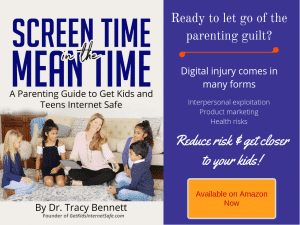
Part 4 of a 4-Part Series: “Sex Ed Tips For Awesome Parenting in the Digital Age”
Surveys demonstrate that kids are viewing Internet sites without parent supervision at younger and younger ages. Prepare your children to manage unexpected situations with confidence and competence. Start with responsible sex education.
5 Sex Ed Topics You Should Be Sure to Cover (plus a bonus that is guaranteed to make uncomfortable).
Tell your kids exactly how their bodies will change as they mature.
Eek! I know this is difficult, but that means covering topics like erections, wet dreams, puberty, and menstruation. Ask your friends if they were prepared for puberty and you’ll see why it’s important to prepare your kids for what is going to happen with their bodies BEFORE their first pubic hair, which means before nine years old for some kids. Change freaks us all out. By telling your kids exactly what to expect you’ll save them from being confused and afraid. And even better than that, you’ll demonstrate that you can be trusted to talk about personal and embarrassing stuff. This optimizes the chance that they’ll come to you when they need your help. Tip: if you bring it up in little bits casually, but with discretion, it won’t be as uncomfortable.
Discuss what sexual desire is and how to best manage it.
By letting your kids know that sexual feelings are normal, you reduce the chance that they’ll feel shame or impulsively act out. Even young children are titillated by romance and sex. Tip: if you discuss it openly then you can more fairly hold them accountable for their choices and behavior.
Teach them how babies are made and about sexually transmitted diseases and birth control.
Center for Disease Control statistics reveal that 47% of high schoolers have had sexual intercourse. And I suspect their parents were the last to know. No matter what you think about premarital sex, your kids must have information in order to make informed and assertive choices. That means you must provide education about what sex is, how to prevent sexually transmitted diseases and pregnancy, and what you think about teens having sex. Saying “just don’t” is not enough. If you’ve trained your children to be blindly obedient to you, they may be blindly obedient to an exploitive peer or an Internet predator. Tip: teaching sex ed is also teaching family values.
Inform them that other kids and adults may try to take advantage of them sexually, and teach them how to assert themselves as soon as they feel the “ick factor.”
It’s not acceptable to scare your kids with stranger danger stories. However, it is critical that you teach them caution. Surveys estimate that up to 30% of 16 years old have received a sexting request. Based on my mothering and clinical experience, I believe these numbers are actually higher. Screen media has opened an informational portal to your children that is barely regulated. Even with the best filtering and monitoring strategies in place, your kids will eventually be approached by someone looking to take advantage of them. Tip: rather than discover that your child has participated in a sexual online activity AND THEN reacting, be preventative by teaching assertiveness skills. That means boys and girls must be taught to attend to their feelings and respond with confidence.
Teach how intimacy differs from sex.
If you’ve been lucky enough to experience loving intimacy, then you know how important it is that your children wait to have sex until they’re mature enough for true intimacy. If you don’t cover this topic, you run the risk that they’ll covertly watch online pornography and conclude “ah-ha. That’s sex!” Tip: loving oneself and knowing how to build friendship must come before sexual experimentation with another person. Which brings me to the bonus!
Bonus: Talk about masturbation as a healthy but private activity.
I know this is controversial, but hang in and consider my reasoning here before you decide what you will do with your kids. By the principles of behavioral conditioning, children will become attached to whatever or whomever brings them pleasure. I once had a client tell me he had his first climax climbing a tree when he was eight years old. He said he was convinced that it was the tree that caused the magic for months before he figured out the real deal. Doesn’t it make sense that your kids should learn that they can achieve sexual pleasure on their own without anybody else’s help? It is really tragic when teens seek a relationship thinking a partner is a required component for pleasure. And we all know what happens to our judgment once we are having sex with somebody. If your teens know their bodies and feel self-empowered, then when they’re ready experiment with interpersonal intimacy, they can focus on mutual affection and friendship rather than sexual pleasure. Personal empowerment will help keep them safe and avoid unhealthy dependence on another. I know it’s tough to think about your kids as sexual, but face it, they are and need information and guidance from informed parents they trust.
We reach the end our our 4-part series! I know this is a difficult topic. Good for you for hanging in there! If you disagree with some of the tips, certainly do what you think is best for your family. I hope it sparked a thoughtful exploration of how you feel about sexual education and gave you some specific tips along the way. As always, it is best for children to go to parents for guidance, but sometimes they need an invitation.
And if this was valuable information, please share www.GetKidsInternetSafe.com with other parents and comment away on our Facebook page to become part of our supportive community.
I’m the mom psychologist who will help you GetYourKidsInternetSafe.
Onward to More Awesome Parenting,
Tracy S. Bennett, Ph.D
Mom, Clinical Psychologist, CSUCI Adjunct Faculty
GetKidsInternetSafe.com
If you can’t relate yet, you will!
Another great resource for sexual education for parents is http://www.siecus.org
Don't worry, we will never spam you.









